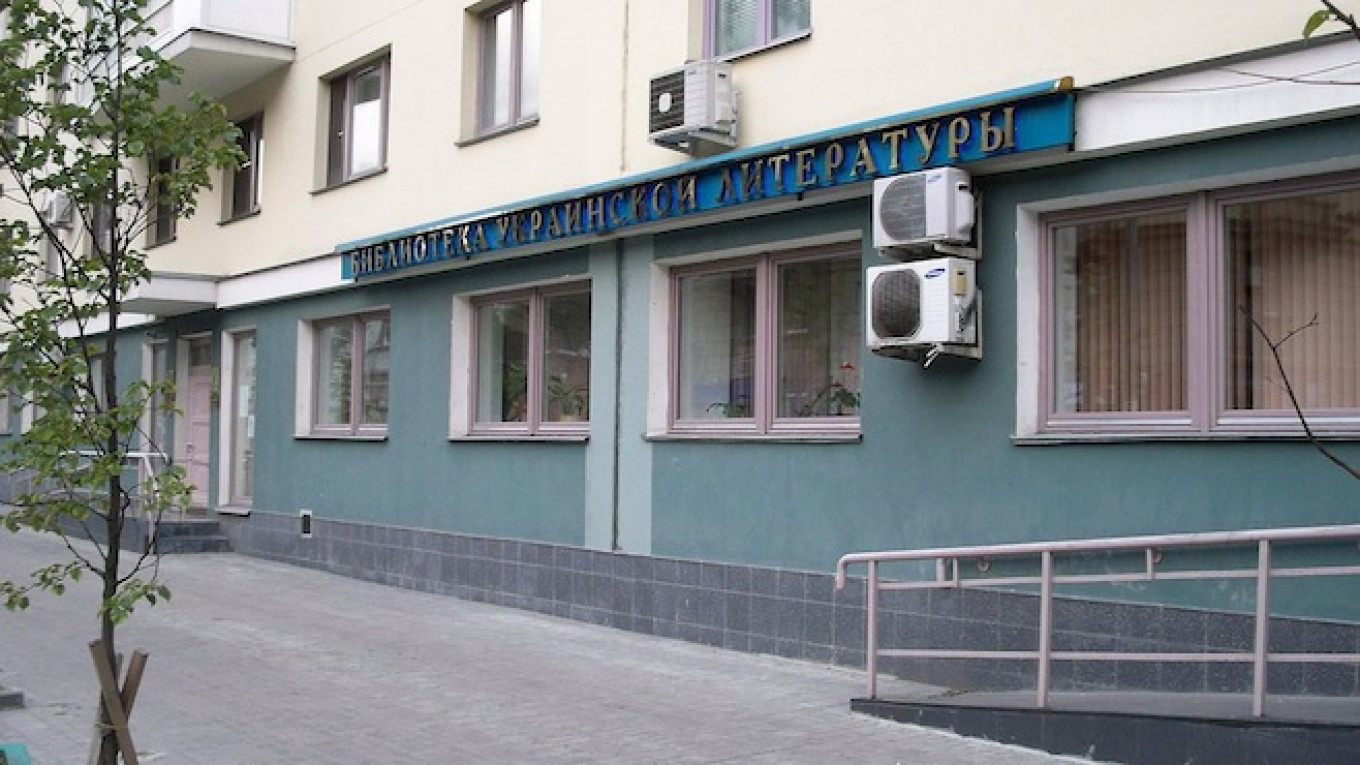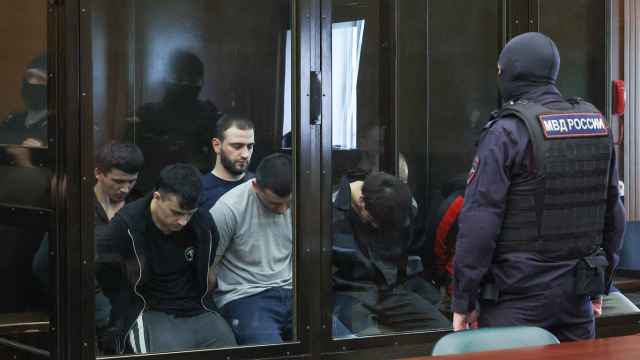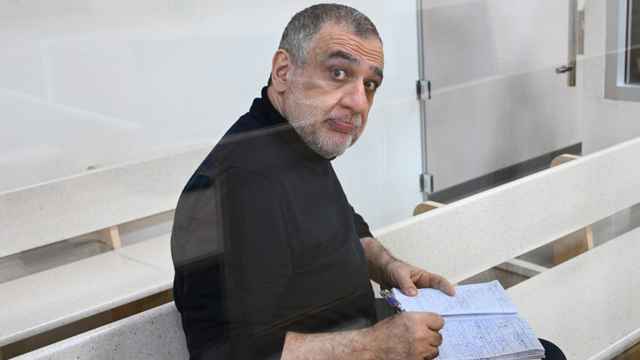On Wednesday the peaceful routine of the Moscow Library of Ukrainian Literature, located in a residential building in northern Moscow, was interrupted by law enforcement officers who raided the library, seizing books and files, and detained Natalya Sharina, the library's director.
The search was prompted by claims that the library was storing newspapers that “distort historical facts” and exhibit a “Russophobic nature,” news reports said, citing unidentified officials.
The move was quickly condemned as politically motivated because of the tension between Russia and Ukraine sparked by Russia's annexation of Crimea last year and Russia's support of separatists in eastern Ukraine.
Ukraine's Foreign Ministry lodged an official protest Thursday against the raid of the library, saying that the search was a “crude and unmotivated” move by Russian authorities.
Police also searched Sharina's apartment and the apartment of Valery Semenenko, co-chair of the Ukrainians of Moscow NGO, the library's longtime partner, and seized books and papers from both.
On Thursday morning, a criminal case was opened against Sharina on suspicion of inciting hatred or animosity toward a social group, an offense punishable by either a large fine, community service or up to five years in prison.
According to the official statement of the Investigative Committee, in 2011-15 Sharina broke the law by “distributing among visitors [to the library] books by Dmitro Korchinsky that were declared extremist by a court and prohibited.”
Korchinsky is a nationalist-leaning Ukrainian politician known for his radical views. Several of his books have been declared extremist in Russia.
Prolonged Crackdown
The wheels for the raid were set in motion by Dmitry Zakharov, a member of the Just Russia party and a municipal deputy for a Moscow district — but not the district where the library is located.
Zakharov, whose most recent Facebook post says he is openly fighting “liberal nits and benderovtsy [a misspelling of 'banderovtsy,' a term with strong negative connotations used to refer to Ukrainian nationalists],” filed a complaint with the police, saying the library was distributing extremist materials.
“I received complaints from concerned citizens, they told me bad things were happening in the library,” the deputy told The Moscow Times in a phone interview. He refused to specify what “bad things” were taking place, saying “it is a question for law enforcement.”
It is not the first time the library has been subject to searches and accusations of distributing extremist literature. It was raided for the first time in 2010, when police officers seized 50 books that contained the word “nationalism” in them, the Lenta.ru news website reported.
A criminal investigation was launched into the library's activities, but in 2011 it was closed for unknown reasons, the report said.
This time the Investigative Committee claims to have found books by Korchinsky that are on the Justice Ministry's list of extremist materials and officially barred from distribution, along with other materials containing “anti-Russian propaganda.”
The library didn't reply to written requests for comments sent by The Moscow Times on Thursday.
Sharina, 58, is currently in custody. On Friday a court will rule whether she will remain under arrest pending an investigation.
Legal Sledgehammer
The case against Sharina is obviously politically motivated, otherwise she would have faced administrative charges applied in cases of minor misdemeanors, said Alexei Petropolsky, director of the Urvista law firm in Moscow. Disseminating extremist materials under Russian law is either an administrative offense or a criminal one, depending on the intensity of the activity, he said.
“If they find [an extremist] book just being kept by someone, they impose a fine [under the administrative code] and forget about it,” he told The Moscow Times in a phone interview.
“But if they prove that the book's owner was, for example, holding conferences [promoting it] and calling for action, that will most probably lead to a criminal case,” Petropolsky said.
To hand out either a suspended or prison sentence to Sharina, the lawyer said, law enforcement officers would have to prove she was promoting the extremist books they found. “For example, that seminars were being held in the library, or that visitors were being told to read the book, that the book was telling the truth about events etc.,” Petropolsky said.
The decision about what charges to impose — administrative or criminal — is up to prosecutors, he added.
Not a Nationalist
Semenenko, the co-chair of the Ukrainians of Moscow NGO whose apartment was also searched and who was questioned by the Investigative Committee as a witness in the case, doubts that Sharina, his longtime acquaintance, kept extremist books in the library.
“There could be literature containing views that differ from the official Russian position, but the most controversial items were stored in a separate room and could only be given to political analysts, historians — those who need it for professional purposes,” he told The Moscow Times in a phone interview Thursday, adding that there were definitely no “controversial” books openly available to regular visitors.
Semenenko has been working closely with the library for years. He said Sharina was appointed in 2007 specifically to prevent a nationalist “virus” spreading in the library, and said the fact that she was arrested for that is “ironic.”
“They failed to nail the library in 2010, so they went for it now, cracking down on the most ardent activists [like me] on the way,” Semenenko said.
Vera Vikulova, a member of the library's public council and head of the House of Gogol library, said that such situations can easily be avoided.
“Lists of books for procurement should be compared to the Justice Ministry's list of extremist materials,” she told The Moscow Times in a phone interview.
Contact the author at [email protected]
A Message from The Moscow Times:
Dear readers,
We are facing unprecedented challenges. Russia's Prosecutor General's Office has designated The Moscow Times as an "undesirable" organization, criminalizing our work and putting our staff at risk of prosecution. This follows our earlier unjust labeling as a "foreign agent."
These actions are direct attempts to silence independent journalism in Russia. The authorities claim our work "discredits the decisions of the Russian leadership." We see things differently: we strive to provide accurate, unbiased reporting on Russia.
We, the journalists of The Moscow Times, refuse to be silenced. But to continue our work, we need your help.
Your support, no matter how small, makes a world of difference. If you can, please support us monthly starting from just $2. It's quick to set up, and every contribution makes a significant impact.
By supporting The Moscow Times, you're defending open, independent journalism in the face of repression. Thank you for standing with us.
Remind me later.






